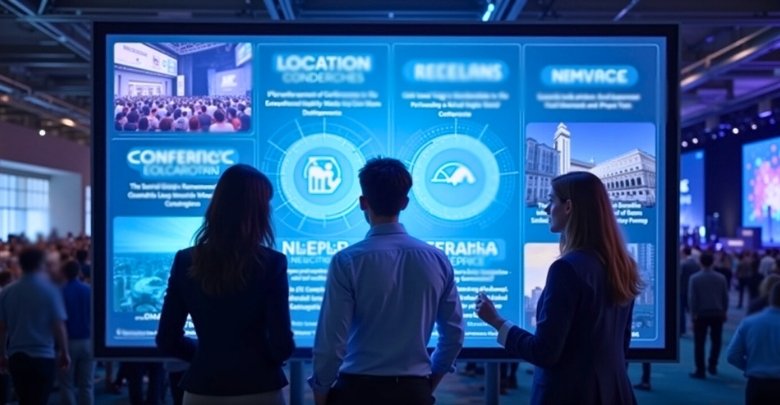Conferences bring people together to share ideas and knowledge. However, not everyone finds them appealing. Some attendees question the value they receive, feeling disconnected or uninspired. This can leave people wondering why do some people hate conferences.
Some people hate conferences due to long, unengaging talks, overwhelming crowds, and high costs. Forced networking, sales-driven presentations, and a lack of practical takeaways add to the frustration. Travel fatigue and limited speaker interaction also make in-person events less appealing.
If you’re curious about these challenges, keep reading. This article dives into the reasons behind this dissatisfaction and offers a comprehensive look at the factors that make some people shy away from attending conferences.
Why Do Some People Hate Conferences?
Listening to long talks that cover the same ideas repeatedly can be frustrating. Some sessions lack engaging discussions and feel more like lectures. When presentations are too one-sided, attendees may struggle to stay interested. Without enough audience interaction, these sessions can become dull, making some people feel like they are just sitting through an endless stream of words without gaining much new insight.

Overwhelming Crowd Sizes
Huge gatherings can be stressful, especially for those who prefer quieter settings. Packed conference halls, noisy networking areas, and crowded registration lines make it difficult to focus. Some people feel drained after spending hours in a bustling environment. For those who enjoy smaller discussions, large conferences can feel impersonal, making it harder to connect meaningfully with speakers and other attendees.
High Costs with Unclear Returns
The expenses tied to attending conferences—registration, travel, hotels, and food—can add up quickly. While some find the investment worthwhile, others struggle to justify the cost, especially if the sessions don’t provide practical takeaways. When a conference doesn’t meet expectations, it can feel like money was wasted, leading some to question whether attending in-person events is worth the financial commitment.
Forced Networking Pressure
Not everyone enjoys walking up to strangers and striking up conversations. Many conferences emphasize networking, but for some, this feels forced and uncomfortable. Small talk and business card exchanges can feel superficial rather than meaningful. When networking becomes more of an obligation than a natural interaction, some people would rather skip the event altogether than deal with the pressure.
Irrelevant or Sales-Driven Talks
Some attendees expect to gain valuable industry insights, only to sit through sales pitches disguised as presentations. When speakers focus more on promoting their products rather than sharing useful knowledge, it can be disappointing. Attendees don’t want to feel like they’ve paid just to be marketed. Instead, they prefer genuine discussions that offer new ideas and real-world applications.
Lack of Practical Takeaways
Conferences often promise fresh perspectives, but some fail to deliver information that can be applied in real life. Attendees may hear inspiring talks but leave without knowing how to implement those ideas. Without clear strategies or action points, the experience can feel like just another motivational session rather than something that brings real value to their work or studies.
Exhausting Travel and Scheduling
Frequent travel and packed event schedules can be physically and mentally draining. Long flights, adjusting to different time zones, and early morning sessions leave little time to rest. Attending back-to-back panels without breaks can lead to burnout. Even if a conference is exciting, exhaustion can overshadow the benefits, making some people question if attending in person is really worth the effort.
Limited Interaction with Speakers
Many attendees look forward to hearing from industry experts but often find limited opportunities to engage with them. Large crowds make it difficult to ask questions or have direct conversations with speakers. Even Q&A sessions are often rushed. When access to experts is restricted, some feel they could have gained the same insights by watching recorded talks online.
Personal Preferences and Convenience
Some simply prefer other ways of learning and networking. With the rise of online alternatives, many are choosing virtual events over in-person gatherings. For those interested in North American events, upcoming conferences in Canada offer options that blend in-person and online formats, making it easier to find an event that suits individual preferences.
Conferences aren’t a perfect fit for everyone. While some succeed in these environments, others feel drained or uninspired. Whether it’s the crowds, the costs, or the format, it’s understandable why some people choose to skip them. At the end of the day, learning and networking should be enjoyable, not exhausting.
How Does Forced Networking Create Discomfort for Attendees?
Networking is an essential part of many conferences, but when it feels forced, it can lead to discomfort for attendees. While connecting with others is valuable, the pressure to engage can make people feel uneasy. Let’s explore how forced networking can negatively impact participants.
Creates Social Anxiety
Forcing attendees into networking situations can heighten social anxiety, especially for those who are naturally introverted. Many find it challenging to approach strangers in a structured environment. This pressure can create discomfort and stress, causing participants to avoid networking events altogether rather than embrace genuine conversation.
Reduces Authentic Interactions
When networking feels forced, the quality of conversations often suffers. Attendees may engage just to fulfill expectations rather than because they’re genuinely interested in connecting. This can result in shallow exchanges, preventing the formation of meaningful relationships that typically arise from authentic interactions and shared interests.
Adds Unnecessary Pressure
Attendees may feel the weight of expectations when networking is imposed upon them. This pressure can cause people to feel inadequate or stressed if they aren’t actively engaging. It detracts from the experience, making it feel more like an obligation than an opportunity to build valuable professional relationships.
Disrupts Focus on Content
The emphasis on forced networking often shifts attendees’ attention away from the primary goal of the conference—learning. As people focus on socializing rather than absorbing the content, they may feel torn between participating in discussions and meeting the networking requirements, ultimately detracting from their overall experience.
Excludes Certain Attendees
Not everyone enjoys group settings, and forced networking can exclude individuals who prefer one-on-one conversations or quieter environments. This can alienate attendees, making them feel disconnected from the event. It creates a barrier to engagement for those who don’t feel comfortable in structured social situations.
Forced networking at conferences can create discomfort by increasing social anxiety, reducing the quality of interactions, and adding pressure. To enhance the experience, conference organizers should offer flexible, low-pressure networking opportunities, allowing attendees to engage naturally without feeling overwhelmed.
What Factors Influence People’s Decisions When Choosing Conferences?
Finding the right conferences can be exciting, but with so many options available, making a decision isn’t always easy. The location, speakers, and relevance all play a role. Understanding what truly matters can help in making a smart choice. Let’s explore the key factors that shape these decisions.
Relevance to Goals
People often choose conferences that match their professional or academic goals. If an event provides insights that align with their interests, it becomes an appealing option. Attendees prefer sessions that enhance their knowledge, skills, or career prospects. Choosing a conference that offers meaningful discussions and industry updates ensures that their time and investment are well spent.
Speaker Lineup and Sessions
The quality of speakers can significantly impact a person’s decision. A strong lineup featuring industry experts makes a conference more valuable. Attendees often review session topics beforehand to see if they offer useful takeaways. Conferences that include interactive panels, Q&A sessions, and thought-provoking discussions are often preferred, as they provide a richer and more engaging experience.
Location and Accessibility
A well-chosen venue can make attending a conference more convenient. People consider factors like travel distance, accommodation costs, and accessibility when making their decisions. Locations with reliable public transport, affordable lodging, and nearby attractions often have a higher appeal. The easier it is to attend, the more likely people are to commit to the event.
Budget Considerations
The cost of attending a conference can heavily influence the decision-making process. Registration fees, travel expenses, and accommodation add up, making budgeting essential. Some events offer discounts, but others may still be expensive. This is where conference selection challenges arise, as balancing costs while ensuring the conference provides value can be difficult for many attendees.
Networking Opportunities
Conferences provide a platform to connect with like-minded individuals, industry professionals, and potential collaborators. Many attendees prioritize events that offer structured networking sessions, social gatherings, or workshops. The chance to exchange ideas, build relationships, and expand professional circles often makes a conference more worthwhile, influencing the final decision to attend.
Making the right conference choice requires careful consideration. By analyzing factors like relevance, cost, and networking potential, attendees can select events that offer the best value. A well-planned decision leads to a more enriching and rewarding experience.
What Attendees Wish Conferences Would Improve?
Conferences offer valuable opportunities to learn, network, and share ideas, but there’s always room for improvement. Attendees often have specific expectations that, if met, could enhance their overall experience. Let’s explore some common areas where conference organizers could make adjustments.
Better Time Management
One common complaint is the poor use of time during conferences. Many attendees feel that sessions often run too long or overlap, leaving little time for networking. By organizing tighter schedules and ensuring breaks between sessions, organizers can provide a more balanced experience that maximizes both learning and interaction.
Improved Networking Opportunities
While networking is one of the main goals of attending a conference, many participants feel it’s not structured enough. Organizers could create more intentional networking events or designated spaces to make it easier for attendees to connect. Facilitating better opportunities for interaction can lead to more meaningful professional relationships.
More Diverse Speakers
A frequent wish among conference attendees is for more diversity in speakers and topics. Including a wider range of perspectives can enrich the discussions and provide a more inclusive atmosphere. Organizers should focus on inviting speakers from different backgrounds to offer a broader spectrum of insights.
Interactive Sessions
Passive listening to presentations is often seen as less engaging. Attendees prefer interactive sessions that encourage audience participation, such as workshops or Q&A panels. Including more hands-on activities or real-time discussions would keep attendees engaged and help them connect the content to practical applications.
Better Organization and Logistics
Many attendees express frustration with conference logistics, such as unclear schedules, difficult navigation, or long wait times. Simplifying registration, providing clear signage, and offering apps or digital resources to track events can significantly improve the overall experience, making it easier for attendees to focus on content rather than logistics.
By addressing these common areas of improvement, conferences could offer a more enriching and efficient experience for attendees. Better time management, networking opportunities, diversity, and organization would ultimately create a more engaging and valuable event for all participants.
Why Do Some People Struggle to Choose the Right Conference?
Some people spend hours searching for the right conference, only to feel overwhelmed by endless options. The fear of picking the wrong one or missing out on something better makes the process stressful. If you’re facing this challenge, keep reading to understand the common struggles and how to overcome them.
Too Many Choices to Sort Through
With conferences happening everywhere, narrowing down options can feel impossible. Every event seems valuable, making it tough to decide which one is worth attending. The more choices available, the harder it becomes to commit to just one. This overwhelming selection process often leads to delays, hesitation, or even missing out on great opportunities entirely.
Unclear Information Causes Confusion
Many conferences fail to provide complete details, making it difficult to assess their true value. Listings with vague descriptions, missing speaker credentials, or unclear agendas create uncertainty. Without enough information, attendees struggle to determine if an event aligns with their goals. This lack of transparency forces people to take risks or avoid committing altogether.
Fear of Investing in the Wrong Event
Conferences require time and money, so no one wants to waste resources on an event that doesn’t deliver value. The fear of spending on travel, registration, and accommodation without guaranteed benefits creates hesitation. Many end up postponing decisions, worried they might choose an event that fails to meet expectations, ultimately missing valuable opportunities for learning and networking.
Struggles in Finding the Right Match
Not all conferences are designed for every attendee. Some are industry-focused, while others concentrate on specific academic or research interests. For instance, those interested in scholarly discussions may struggle with finding academic conferences easily if they don’t have reliable sources. Without access to the right platforms, choosing a suitable event becomes more time-consuming and frustrating.
Outside Opinions Create More Doubts
Recommendations from colleagues or online reviews can sometimes add to the confusion instead of simplifying the decision. Different perspectives lead to mixed opinions, making it harder to finalize a choice. While external advice is helpful, personal goals should always take priority. Relying too much on what others suggest can lead to attending an event that isn’t the right fit.
Struggling to choose the right conference is common, but understanding these challenges can make the process easier. By focusing on personal interests, researching thoroughly, and trusting your instincts, finding the best conference becomes much simpler and stress-free.
FAQs About Why Do Some People Hate Conferences?
Conferences offer opportunities for learning, networking, and professional growth, but they aren’t for everyone. Some people find them overwhelming, exhausting, or even frustrating for various reasons. Below are some common questions about why people dislike conferences and what factors contribute to their negative experiences.
Why Do Some People Feel Out of Place at Conferences?
Not everyone feels comfortable in a conference setting, especially if the topics or attendees don’t align with their interests. When an event lacks diversity in discussions or includes too much insider jargon, some attendees struggle to engage. Feeling disconnected from the content or the crowd can make conferences seem unwelcoming.
Why Are Some Conferences Overly Formal and Rigid?
Certain conferences maintain strict schedules, limiting attendee interaction and flexibility. When everything is highly structured, participants might feel like they’re just following a routine rather than actively engaging. A lack of informal discussions, breakout sessions, or interactive formats can make events feel stiff, discouraging open conversations.
Why Do Some People Dislike Conference Food Options?
Food is an overlooked aspect of conferences but plays a role in the overall experience. Limited meal choices, long buffet lines, or poor-quality food can frustrate attendees. Those with dietary restrictions may struggle to find suitable options, making mealtimes an inconvenience rather than a chance to refuel and connect with others.
Why Do Some Conferences Feel Too Commercialized?
Some events focus more on sponsorships and advertisements than meaningful discussions. When sessions are filled with promotional content or speakers are pushing products, attendees may feel like they’ve paid to be marketed to. People attend conferences for insights and discussions, not to sit through disguised sales pitches.
Why Is Conference Seating Sometimes Uncomfortable?
Sitting through long sessions can be challenging, especially with poorly arranged seating. Hard chairs, cramped spaces, or awkward layouts make it difficult for attendees to focus. Those who prefer more movement or need frequent breaks may find it uncomfortable to stay seated for extended periods without feeling restless.
Why Do Some Conferences Feel Too Repetitive?
Attending multiple conferences in the same industry can sometimes feel redundant. When speakers, topics, and discussions repeat across different events, attendees might lose interest. People look for fresh perspectives and engaging content, so when conferences fail to offer something new, they start feeling like they are having the same experience over and over again.
Why Do Some People Avoid Attending Conferences Alone?
Solo attendees may find it difficult to connect with others, especially in large conferences. Walking into a room full of groups can feel isolating, making it harder to start conversations. Without structured introductions or inclusive networking activities, some people feel left out, reducing their enthusiasm for attending future events.
Why Do Some Conferences Have Poor Event Coordination?
Disorganized schedules, last-minute changes, or unclear directions can frustrate attendees. Poor time management, delayed sessions, or technical issues affect the overall experience. When an event lacks smooth coordination, it creates stress instead of providing a seamless and enjoyable learning environment.
Why Do Some People Feel Drained After Conferences?
Long days packed with sessions, networking, and travel can leave attendees physically and mentally exhausted. Some conferences run on tight schedules, leaving little time for breaks or relaxation. By the end of the event, people may feel overwhelmed rather than inspired, making them hesitant to attend similar events in the future.
End Note
Some people find conferences overwhelming, exhausting, or even frustrating because of factors such as large crowds, high costs, or poorly planned sessions. Attending can seem more like an obligation than a rewarding experience when expectations don’t match reality.
If you’ve ever wondered why do some people hate conferences?, the answer is often tied to the structure and experience of these events. Long, repetitive sessions, forced networking, or disorganized schedules can make them feel unproductive. When conferences fail to provide real value, many attendees start questioning if they are truly worth attending.
You can still maximize conferences by choosing events wisely. Find engaging sessions, meaningful networking opportunities, and well-planned schedules. If a conference doesn’t suit your style, you may be able to find a better fit by exploring online alternatives. Best wishes!







